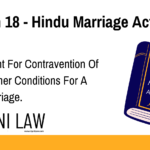1. Exact Code:
Contents and verification of petitions.—
(1) Every petition presented under this Act shall state as distinctly as the nature of the case permits the facts on which the claim to relief is founded 3[and, except in a petition under section 11, shall also state] that there is no collusion between the petitioner and the other party to the marriage.
(2) The statements contained in every petition under this Act shall be verified by the petitioner or some other competent person in the manner required by law for the verification of plaints, and may, at the hearing, be referred to as evidence.
2. Explanation:
This section outlines the essential elements and procedures for filing petitions under the Hindu Marriage Act. It stipulates the following:
- Petition Content: All petitions must clearly state the factual basis for the relief sought, providing a detailed account of the circumstances leading to the petition.
- Non-Collusion: Except for petitions under Section 11 (regarding restitution of conjugal rights), the petition must explicitly declare that there is no collusion between the parties involved in the marriage.
- Verification: The petition must be verified by the petitioner or a competent person, adhering to the legal requirements for verifying plaints.
- Evidence: The verified statements in the petition can be presented as evidence during the court hearing.
3. Illustration: Section 20 – hindu marriage act
Consider a case where a husband files a petition for divorce under the Hindu Marriage Act. The petition would need to include:
- Detailed description of the grounds for divorce, such as adultery, cruelty, or desertion.
- Specific instances and evidence supporting the allegations.
- A statement affirming that there is no collusion with the wife regarding the petition.
The husband would then have to verify the petition by signing an affidavit confirming the truth of its contents.
4. Common Questions and Answers:
Q: What happens if a petition doesn’t adhere to Section 20?
A: The court may reject the petition if it lacks the required information, fails to declare non-collusion, or is not properly verified.
Q: Can the verified statements be challenged during the hearing?
A: Yes, the other party can challenge the statements in the petition and present evidence to dispute their veracity.
Q: Can a person other than the petitioner verify the petition?
A: Yes, if the petitioner is unable to verify the petition due to physical or mental incapacity, another competent person can verify it on their behalf.
Conclusion
Section 20 of the Hindu Marriage Act plays a vital role in maintaining the integrity of matrimonial proceedings by mandating that all petitions clearly state the facts and be verified in accordance with civil procedure. This ensures that the claims made are truthful and legally accountable, preventing misuse of the legal process. Proper verification lends credibility to the petition and provides a solid foundation for the court to evaluate the case. By enforcing clarity and authenticity, Section 20 strengthens the fairness and reliability of matrimonial litigation.
For accurate legal drafting and expert help with matrimonial petitions, visit ApniLaw.








